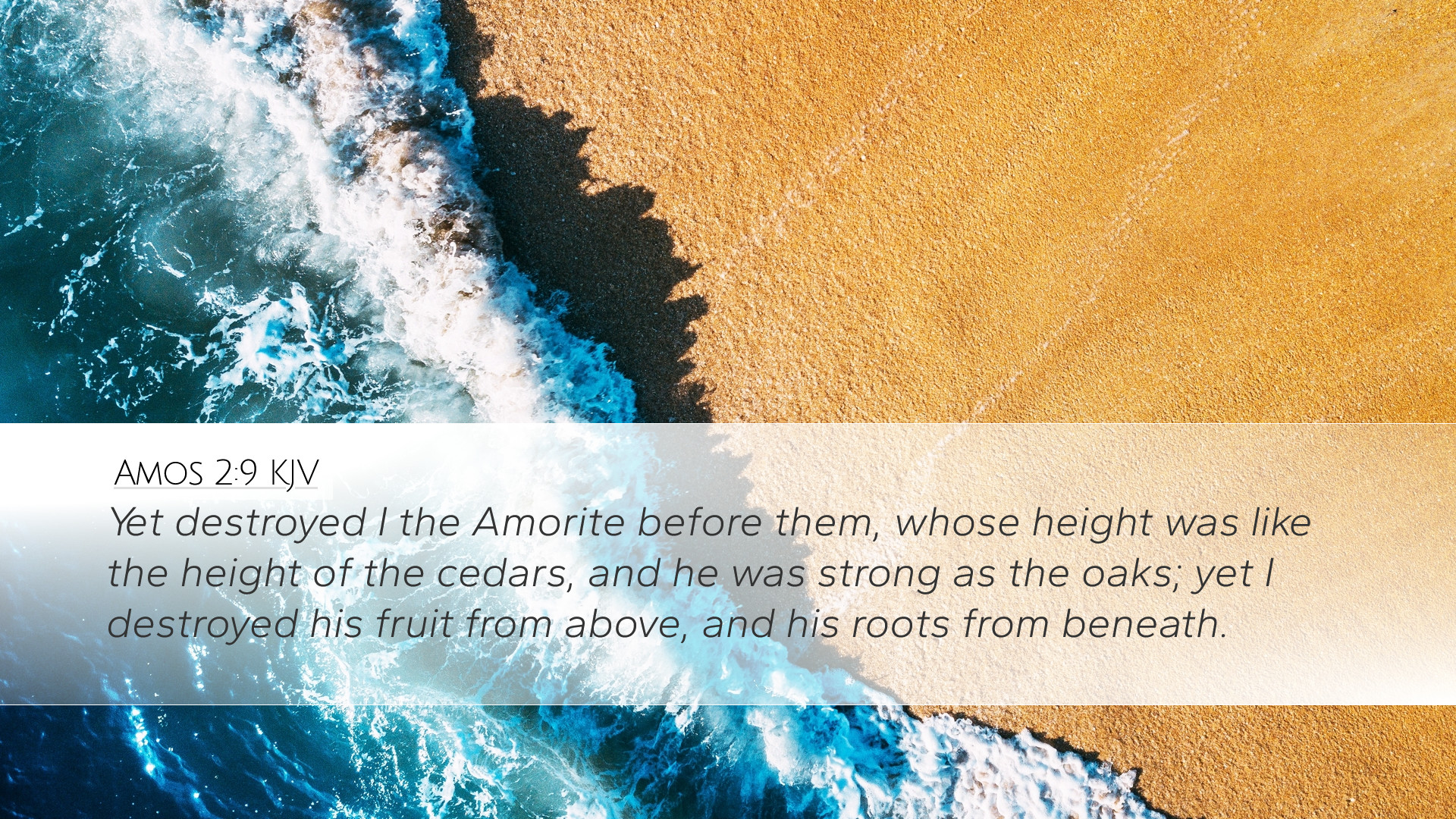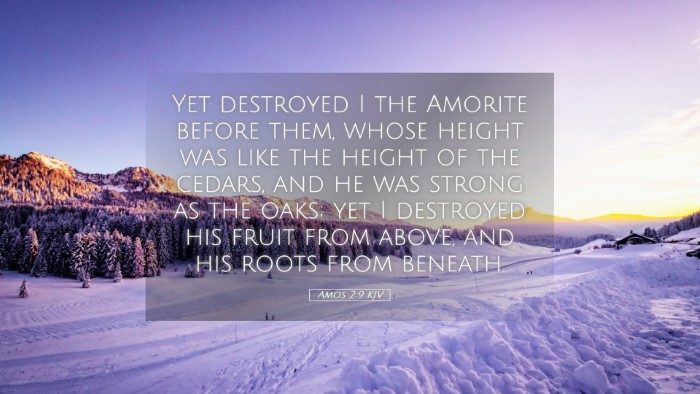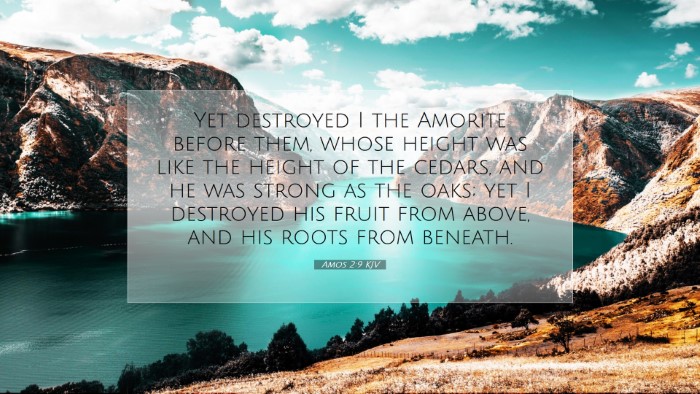Old Testament
Genesis Exodus Leviticus Numbers Deuteronomy Joshua Judges Ruth 1 Samuel 2 Samuel 1 Kings 2 Kings 1 Chronicles 2 Chronicles Ezra Nehemiah Esther Job Psalms Proverbs Ecclesiastes Song of Solomon Isaiah Jeremiah Lamentations Ezekiel Daniel Hosea Joel Amos Obadiah Jonah Micah Nahum Habakkuk Zephaniah Haggai Zechariah MalachiAmos 2:9
Amos 2:9 KJV
Yet destroyed I the Amorite before them, whose height was like the height of the cedars, and he was strong as the oaks; yet I destroyed his fruit from above, and his roots from beneath.
Amos 2:9 Bible Commentary
Commentary on Amos 2:9
Introduction: The Book of Amos, one of the Minor Prophets, provides profound insights into the socio-political and spiritual climate of Israel during the 8th century B.C. Amos 2:9 stands as a powerful reminder of God's might and His judgment against sin. Below, we provide a comprehensive commentary on this verse, drawing insights from public domain commentaries, aiming to illuminate its meaning for pastors, students, theologians, and scholars.
Text of Amos 2:9
“Yet destroyed I the Amorite before them, whose height was like the height of the cedars, and he was strong as the oaks; yet I destroyed his fruit from above, and his roots from beneath.”
Contextual Background
Historical Setting: The prophet Amos emerged during a prosperous yet morally corrupt period in Israel. His ministry spanned roughly from 760 to 750 B.C. The Israelites, having experienced significant territorial expansion and wealth, had turned away from God, engaging in idolatry, injustice, and oppression. Amos's prophecies serve as both a warning and an indictment of this moral decline.
In the context of Amos 2:9, the reference to the Amorites signifies the historical antagonists of Israel who inhabited the land prior to Israel's conquest under Joshua. The Amorites symbolized those nations opposed to God's people, quintessentially representing sin and opposition to God's divine order.
Divine Sovereignty in Judgment
Commentary Observations:
- Divine Intervention: Matthew Henry emphasizes that God actively intervened in history to destroy the Amorites, a testament to His sovereign authority over nations. This act signifies that no power can withstand God's will.
- Symbolism of Strength: Albert Barnes comments on the metaphor of the Amorite's stature—tall as cedars and mighty as oaks. These images portray the seemingly insurmountable strength of their fortifications and resistance against God’s people, yet they were brought low by divine decree.
- The Nature of Divine Justice: Adam Clarke notes that God's judgment is comprehensive, affecting both the outward appearance (the fruit from above) and the roots (the foundation). This holistic approach to judgment underscores that no institution or individual is exempt from God's scrutiny.
Relevance to God’s People
Lessons for Today: Amos 2:9 serves as both a historical account and a theological principle relevant to contemporary audiences. It challenges believers to reflect on the nature of God's relationship with humanity, His sovereignty in history, and the assurance that He judges sin.
- Hope in God’s Justice: Pastors can illustrate the assurance that God's justice ultimately prevails, even when it seems that sinful nations or individuals thrive. His timing may differ from human expectations, but His sovereignty is unassailable.
- Call to Righteousness: The text serves as a motivation for congregations to pursue holiness, knowing that just as God judged the Amorites, He examines the hearts and actions of His people today.
- A Reminder of God’s Power: The imagery of the towering cedars and oaks emphasizes that God’s power transcends human might and worldly structures. This provides comfort to believers faced with societal challenges that seem formidable.
Theological Implications
The Nature of God: The destruction of the Amorites reveals God's attributes—His justice, sovereignty, and ability to restore order. Each of these elements is critical for understanding God's role in creation and His expectations for humanity.
- Justice and Mercy: While God's judgment is evident, it operates within the framework of His mercy. He desires repentance over destruction, a theme consistently addressed throughout the prophetic literature.
- Hope for Redemption: Furthermore, the verse can point to the hope exhibited in the messianic promise. Just as God judged the Amorites, His faithfulness to Israel leads to ultimate redemption through Christ.
Conclusion
Amos 2:9 encapsulates compelling truths about God’s sovereignty, justice, and the need for righteousness among His people. By reflecting on this verse, one can gain a more profound understanding of God's dealings with humanity throughout history, and its implications for the present day. Pastors, students, and scholars alike are encouraged to meditate on the attributes of God as revealed in this verse, allowing it to inspire a life committed to His ways amidst the challenges of today's world.


